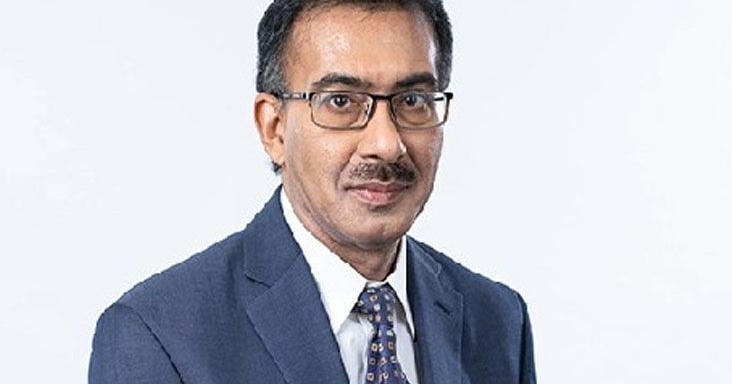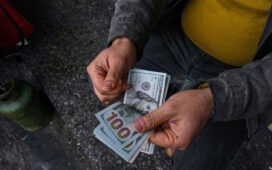Foreign exchange limitations continue to pose significant challenges for individuals and businesses, particularly small to medium enterprises (SMEs) in Trinidad and Tobago.
To address this issue, Varun Maharaj, chief executive officer of Maritime Capital Ltd, emphasised the need for proactive management of imports and government debt, along with strong fiscal policies.
Economist Dr Vaalmikki Arjoon
He made these remarks during his feature address at the Forex Matters discussion forum, hosted at the Trinidad and Tobago Chamber of Industry and Commerce in Westmoorings.
“Government debt stands at US$5.587 billion and then compare it to 2015, it was US$2.2 billion. I think more proactive management and fiscal policy is needed to ease forex pressures as it is today in the country,” Maharaj said.
As Carnival season approaches, Maharaj highlighted that tourists will exchange their currency for local money. However, even if the projected US$100 million in earnings proves accurate, he questioned whether Carnival is a net earner of foreign exchange, given that tourism-related activities contribute significantly to the demand for forex.
“Even if the estimates are true – that we earn US$100 million – tourism-related businesses such as hotels and Carnival bands contribute to the demand for foreign exchange. I’d ask, is Carnival a net earner of foreign exchange?” he asked.
Maharaj also pointed out that fete promoters are increasingly requesting payment in US dollars for tickets and packages.
“It tells you the kind of problem that we have,” he said.
Maharaj stressed that it is crucial to identify the causes of the forex issue within a short time frame of three to six months. He believes that understanding these causes will allow decision-makers to determine whether the solution should focus on increasing supply or managing demand more effectively.
“The question is which options are viable and how quickly can they be implemented? Another thing that comes to mind is should the exchange rate be adjusted. Finding the balance between stability and flexibility is critical,” he said.
Maharaj continued: “Another issue is foreign exchange should be distributed more efficiently and effectively. Within the short term, we must also consider if the demand for forex can be better managed.”
Looking at medium-term solutions (one to three years), Maharaj suggested that the country must reduce its dependence on energy exports and focus on building new forex-generating industries. He also called for a more efficient and transparent foreign exchange allocation system.
“The country must reduce its dependence on energy exports and build new forex-generating industries. The foreign exchange allocation system must also be more efficient and transparent and what I mean by that is a more predictable and fair system could help restore confidence and reduce panic buying of forex. When we speak about the exchange rate system, I think it has to become more flexible, but they should be as careful adjusting to the foreign exchange rate policies, which could make it more accessible and reduce black market reliance.”
Maharaj added that the Government must attract more foreign direct investment by bringing in more long-term foreign investment with boosted reserves and stabilised forex availability.
“Another aspect that we need to deal with is government debt and fiscal policy to ease for expression a more disciplined fiscal policy can prevent foreign exchanges from listening, and some of the long-term solutions are such things as permanently diversifying the sources of foreign exchange, and diversified economy is the only sustainable way to ensure stable forex includes the education system should be restructured to support a forex generating economy. We need to build a workforce skill in forex-generating fields like tech, finance and logistics, so building human capital is essential for a competitive and diversifying economy,” he explained.
Additionally, he suggested reducing the country’s dependence on imports to lower forex demand.
“In terms of the long term, we should look at what role digital finance, FinTech and e-commerce, play in forex sustainability. If you look at Malta and Mauritius, these countries have explored the blockchain to develop something in forex solutions so a tech-driven economy can open new forex-generating opportunities beyond traditional sectors. The future of T&T will have a good economy, it depends not just on government action, but on how aggressively the private sector innovates, expands and diversifies,” said Maharaj.
Economist Dr Vaalmikki Arjoon noted that the limitations on foreign exchange might also stem from commercial banks, whose primary goal is to maximise shareholder profits. He highlighted the significant growth in the use of credit cards, particularly for US dollar transactions.
“We’re seeing a much greater distribution of credit cards. In fact, the US dollar, the US purchases utilising credit cards have increased from over US$600 million US in 2014 and by the end of last year, that figure went up to around US$2 billion. So that’s an increase in the US usage via credit cards of about 229% within that ten-year gap. So that’s quite significant.”
He added that businesses have been struggling with constantly reduced credit card limits and limited access to forex.
“When you go to the commercial bank or authorised dealers, you’re not getting an adequate amount of money. So, they have no choice but to use the credit card facility to pay their suppliers from abroad and this is part of the reason why many of them are taking multiple credit cards. There are some companies that are getting their employees to take on credit cards so that they can utilise those credit cards to import but of course, the company will pay the bill right on behalf of the employee. That is how dire the situation has gotten,” he said.
Arjoon also raised the question of whether this trend reflects a strategy by authorised dealers to distribute foreign exchange via credit cards rather than the conventional method of simply selling it to customers.
“Because when you issue more credit cards, it translates into more revenues for the commercial banks, so the fees that you have are paid to them. And of course, you have interests when you don’t pay off your credit card on time. I think that’s another critical area that we also need to consider. But at the end of the day, remember the authorised dealers, their main prerogative is to maximise shareholder wealth,” he said.




